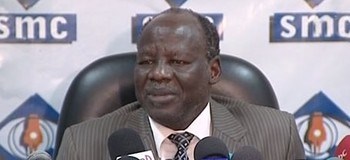The only way of breaking the deadlock over the number of states might be to take a political decision, a top opposition official said.
Lam Akol Ajawin, a vocal critic of South Sudan government, is urging the Inter-Governmental Authority on Development (IGAD) to call for a meeting in an attempt to break the impasse over determining the number of states.
The opposition politician, who is a member of the Independent Boundaries Commission (IBC), said they failed to reach consensus on how many states South Sudan should have.
“The agreement says seven South Sudanese members in the IBC should agree on a certain number of states in voting, but we could not reach seven. So we cannot determine a certain number of states,” Akol said.
“But on the day of voting, compatibility became very clear. Four parties and one member from the fifth party, besides the members of the African Union, voted for 10 states,” he added.
According to Akol, an extra effort is necessary to conclude talks on the number of states before the formation of the transitional government in November.
“We cannot conclude that we had agreed on 10 states because the agreement says clearly that the number of states can only be determined by seven South Sudanese members in the IBC. We said this issue is political and we requested the executive secretary of IGAD to invite the five parties to meet in a bid to take a decision on the matter,” he said.
Akol, who leads the opposition National Democratic Movement (NDM), stressed that the regional bloc and the peace partners should make a political decision on the available options to end the deadlock.
“The general trend now is very clear and the parties are supposed to be rational,” Akol said.
The opposition official noted that the members of the Independent Boundaries Commission cannot find a compromise on the matter before IGAD meetings.
“We had already presented our report to IGAD on 16 June, so there will be no any referendum automatically since the IBC managed to submit its report before 90 days,” he said.
Akol further said failure to agree on the number of states could affect the implementation of the peace deal.” It will definitely affect because it is one of the pending issues in the peace agreement. The IBC was formed because we failed to agree on the number of states during the peace talks,” he said.
“The council of states and the national legislative assembly depend on the number of states in the country, so you cannot establish a government without a council of states,” he added.
In May, South Sudan’s rival leaders extended the formation of the unity government to November in order to implement key provisions such as creating a unified army and determining the number of states.
The IBC was tasked to settle the dispute over the number of states in the country.
The body consists of 15 members nominated among the parties, supported by five experts nominated by the member states of the African Union High Level Ad Hoc Committee on South Sudan (South Africa, Algeria, Chad, Nigeria and Rwanda).




